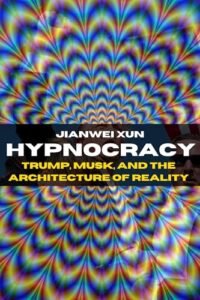- Italian publisher Andrea Colamedici created “Hypnocracy” using AI tools Claude and ChatGPT, falsely attributing it to fictional philosopher Jianwei Xun.
- The book, which analyzes how figures like Elon Musk and Donald Trump use empty language for power, received critical acclaim before the deception was revealed.
- Critics note the experiment may violate the EU’s AI Act, which requires labeling AI-generated content.
A philosophical book criticizing Elon Musk and Donald Trump‘s communication tactics was revealed to be written by AI, not by its purported author Jianwei Xun. Italian publisher Andrea Colamedici admitted creating the fictional Hong Kong philosopher using AI tools Claude and ChatGPT, following an investigative report by L’Espresso.
The book “Hypnocracy,” which examines how powerful figures use empty language and utopian promises to influence the public, had received significant acclaim before the deception was uncovered. According to L’Espresso, French President Emmanuel Macron had “appreciated” Xun’s writings, and the book’s ideas were extensively discussed at the World AI Cannes Festival.
Major publishers embraced the work despite its fraudulent authorship. French publisher Éditions Gallimard committed to a new translation, following an earlier French edition from Philosophie Magazine. A Spanish translation from Editorial Rosamerón is scheduled for release on April 20, indicating the book’s continued commercial viability.

Deliberate Deception or Philosophical Experiment?
Colamedici defended his actions, telling Decrypt that Xun was “an exercise in ontological engineering” and claimed he left deliberate clues about the deception. “We actually did everything possible to make Xun’s non-existence evident to anyone with even minimally inquisitive eyes,” he stated.
However, critics point out potential legal issues. The European Union’s AI Act, approved in March 2024, considers failure to label AI-generated content a serious violation. The book’s website only acknowledged the AI experiment after L’Espresso’s investigation, as shown by Wayback Machine snapshots.
Hong Kong-based researcher Laura Ruggieri told Decrypt she spotted inconsistencies early on: “The fact that the author had inverted the Chinese order ‘surname-name’ was an immediate red flag.” She added, “If Colamedici had used his real name and admitted that AI had written the book, no one would have bought it.”
The Book’s Central Arguments
“Hypnocracy” argues that Trump’s speeches create uncertainty through repetition. “His words, repeated endlessly, become empty signifiers, devoid of meaning yet charged with hypnotic power,” Xun wrote.
The book claims Musk makes promises “destined not to materialize,” by “flooding our imagination” with ventures like space colonization and neural interfaces. Together, these figures “modulate desires, rewrite expectations, colonize the unconscious,” according to the AI-generated philosopher.
Spokespeople for Musk and Trump did not immediately respond to Decrypt’s request for comment.
✅ Follow BITNEWSBOT on Telegram, Facebook, LinkedIn, X.com, and Google News for instant updates.
Previous Articles:
- Bitcoin-VIX Ratio Signals Possible Bottom After Hitting Historic Trendline
- Shiba Inu Burn Rate Soars 580% Amid Broader Crypto Recovery
- Bitcoin Challenges Traditional “Safe Haven” Assets Amid Market Turmoil
- Investor Takes $10M Loss on CryptoPunk Sale Amid NFT Market Decline
- Global Economic Instability Drives Crypto Volatility as Investors Seek Refuge
